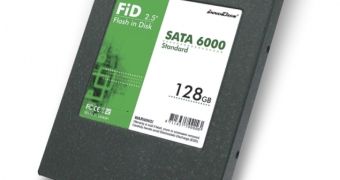InnoDisk has just introduced its newest 2.5-inch solid-state drive in the FiD 2.5-inch SATA 10000 family, that is alleged to be the highest capacity SLC NAND Flash drive at 128 Gb densities. If you were impressed by OCZ's recently introduced ultra-fast solid-state drive, than strap your seatbelt, because InnoDisk's offering will surely knock you out.
The 2.5-inch solid state drive connects to the computer via a standard Serial ATA 2.0-3Gbps interface that allows it to deliver sustained read/write speeds of 110Mbps and 90Mbps, respectively. The rugged metal enclosure protects the fragile circuitry inside against accidental drops or mechanical shocks.
The unit can deliver burst read rates up to 300Mbps and random read and write rate of over 9500 and 550 inputs/outs per second (IOPS) for a 512-byte transfer. Designed for the enterprise environment, the FiD 2.5-inch SATA 10000 can deliver 20 percent more performance than a conventional SCSI hard-disk drive.
The greatest disadvantage in using solid-state storage is the fact that it has a limited number of read/write cycles until it wears out and becomes unusable. InnoDisk has fixed this shortcoming and pushed the "mean time until failure" value to new peaks.The drive comes with a write/erase endurance of approximately eight years, measured for about 1TByte of write/erase cycles per day. This achievement is possible thanks to the integrated, exclusive controller chip design that packs InnoDisk's proprietary wear leveling technology, as well as bad block management algorithms.
InnoDisk's FiD 2.5-inch SATA 10000 disks are suitable for storage-intensive applications on the enterprise, military, aerospace, commercial aviation, and industrial markets, as well as in any environment that demands both performance and ruggedness.
The device will hit the market later this month in sampling amounts only. Mass-availability is slated for the second quarter of the year in capacities ranging from 32GB to 128GB. There is no word on pricing yet, but, given the fact that it is a professional-only piece of hardware, expect it to be significantly more expensive than an average 128 GB SSD.

 14 DAY TRIAL //
14 DAY TRIAL //